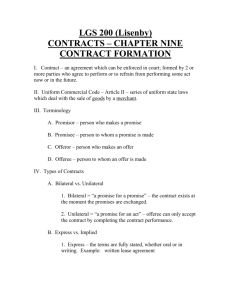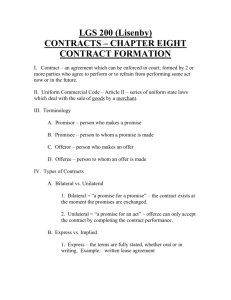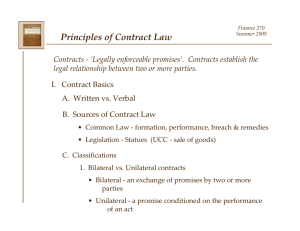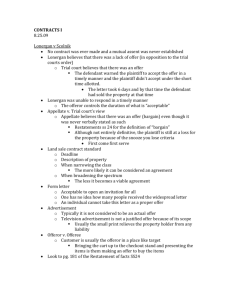LAW - WordPress.com
advertisement
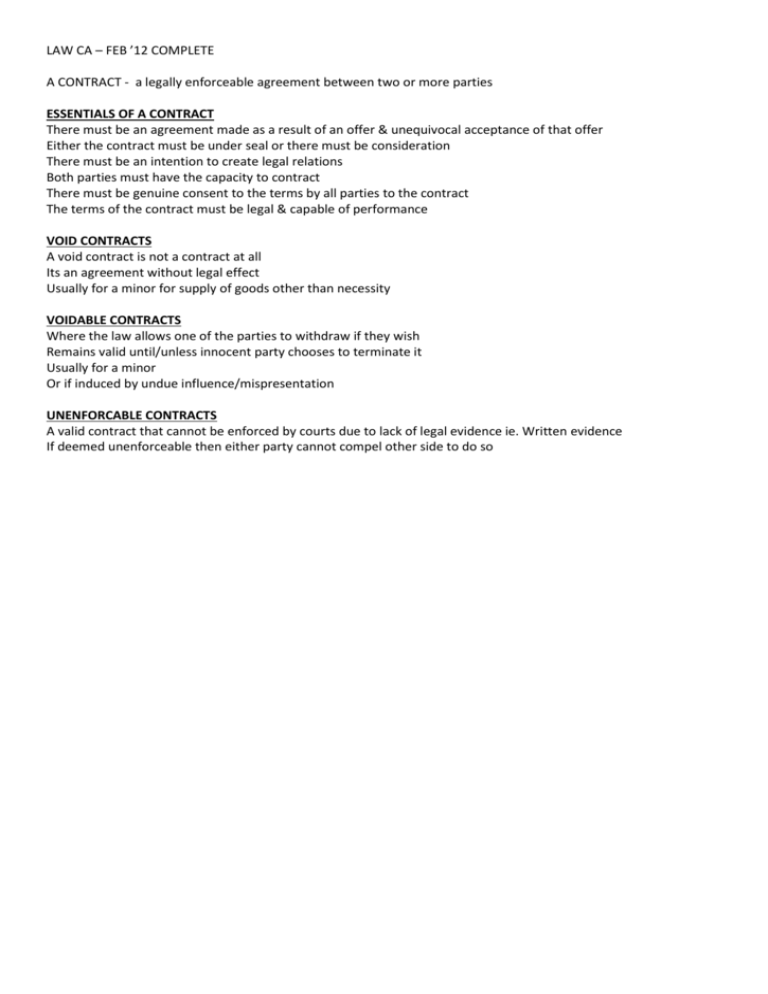
LAW CA – FEB ’12 COMPLETE A CONTRACT - a legally enforceable agreement between two or more parties ESSENTIALS OF A CONTRACT There must be an agreement made as a result of an offer & unequivocal acceptance of that offer Either the contract must be under seal or there must be consideration There must be an intention to create legal relations Both parties must have the capacity to contract There must be genuine consent to the terms by all parties to the contract The terms of the contract must be legal & capable of performance VOID CONTRACTS A void contract is not a contract at all Its an agreement without legal effect Usually for a minor for supply of goods other than necessity VOIDABLE CONTRACTS Where the law allows one of the parties to withdraw if they wish Remains valid until/unless innocent party chooses to terminate it Usually for a minor Or if induced by undue influence/mispresentation UNENFORCABLE CONTRACTS A valid contract that cannot be enforced by courts due to lack of legal evidence ie. Written evidence If deemed unenforceable then either party cannot compel other side to do so OFFER The first essential of a valid contract An offer exists where the offeror undertakes to be contractually bound if the offeree makes a proper acceptance. It is a definite promise to be bound on certain specific terms. The terms of an offer must be clear, certain & complete It cannot be vague The offer must be communicated to the other party Can be communicated to a person, group or public at large The offer must be made by written, spoken or inferred by conduct Letter, phone, fax, or any means which is appropriate & reasonable in circumstances The offer must be intended as such before a contract can arise If it is not with a view to create legal relations RECOGNISING AN OFFER An offer is NOT: The answer to a question or supply of information Invitation to treat An invitation to another person to make an offer An invitation to treat cannot be accepted To advertise goods or display goods Statement of intention If a person states they intend to perform some act & they don’t Ie. Father states his son will be beneficiary to estate doesn’t form a contract An option The right to buy / sell something at a specified price TERMINATION OF AN OFFER By revocation before valid acceptance The offeror can revoke / withdraw at any time, even within specified time frame Lapse of time Will terminate at the end of a specified time If no time, then what is considered reasonable time Rejection or counter offer If outright rejection is communicated A rejected offer cannot subsequently be accepted Failure of express or implied condition Death of offeror or offeree ACCEPTANCE ESSENTIALS OF A VALID ACCEPTANCE Acceptance may be oral, written or implied by conduct Dispatching goods in response to offer Carbolic smokeball, by using the smokeball Acceptance must be clear & unqualified & must match offer exactly Acceptance must be communicated to & received by offeror Otherwise no enforceable contract exists Acceptance must be communicated by the offeree, or by someone with their authority, to the offeror The offeror may expressly or impliedly stipulate the method of acceptance Unless offeror states this is only method of acceptance they may accept other forms of acceptance as long as offeror suffers no disadvantage COMMUNICATION OF ACCEPTANCE Offeree / agent must communicate acceptance to offeror / agent EXCEPT: Where performance of an act or the conduct of a person is deemed to constitute acceptance. CARBOLIC SMOKEBALL A ‘unilateral contract’ may be established whereby offer includes a term providing that complete performance or conduct by the offeree will constitute complete acceptance. No need for advance notice of acceptance. Where acceptance is made by post An offer effect if & when it is received. Acceptance by letter takes effect when it is posted. CONSIDERATION Consideration is required for all enforceable contracts, except deeds under seal. DEFINITION Some right, interest, profit or benefit accruing to the one party or some forbearance, detriment, loss or responsibility given, suffered or undertaken by the other. Consideration can consist of doing something, refraining from doing something or making a promise in return for the other party doing any of the above. If there is no consideration the agreement is unenforceable unless it is under seal or unless the principle of promissory estoppel applies. Consideration must be of some value but need not be adequate Anything of value which contributes to the bargain made is recognised in law as good consideration. It can money, land, goods, services or any undertaking which confers a benefit on one party or represents a loss to the other Existing Legal obligation Performance of an existing legal obligation imposed by statute is no consideration for a promise. However, of some extra service is given then that is sufficient consideration Consideration mist be provided by the promise Consideration is the price of a promise, so a person can only enforce a promise if they themselves provided the promise ie. Consideration must move from the promisee Past Consideration – consideration must not have been provided prior to the agreement Is any act which has already been performed before a promise in return is given & is not sufficient to enforce the promise EXCEPTIONS Past consideration will support bills of exchange (cheques) since most of these are issued to pay existing debts Past consideration supports a later promise to pay for something done at the promisors request ie. That consideration provided in the past will be good consideration when it was understood at the time there would be payment in the future RULE IN PINNEL’S CASE Consideration must be given to enforce the waiving of a contractual obligation Payment of part of a debt is not good consideration for a promise to write off the balance of a debt If a party to a contract waives existing right which it has under the contract,it is not legally bound by such a waiver unless it has received consideration for it. This is because the waiver leads to a new agreement which must be accompanied by consideration to make it enforceable. EXCEPTIONS TO PINNEL If the creditor accepts payment of a lesser sum in full settlement before the due date, the payment discharges the whole debt If the creditor accepts anything different to which already entitled Ie. Goods instead of cash, even though the value of the goods may be less than the cash value If the creditor accepts part payment in full settlement from a third party. The creditor will have received consideration from whom they had no previous claim If a group of creditors arrange that they will each accept part payment in full settlement. This will be binding among themselves. If it can be enforced under PROMISSORY ESTOPPEL PROMISSORY ESTOPPEL An equitable exception to pinnels case Equity mitigates the hardship that could be caused to person who relies on a promise that debt will not be enforced in full. Under the principle, where a person makes a promise, unsupported by consideration, to waive a debt or other obligation, and where the promisee acts on this promise, the promisor is estopped (prevented) from retracting the promise However, the principle prohibits promisors from insisting on their strict legal rights when it would be unjust to allow them to do so. If the circumstances give rise to the promise to accept less change, then the promisors right to insist on full payment can be revived It only applies to a promise of waiver which is voluntary o It does not apply to a promise under threat “take €x or nothing !!” It is a shield not a sword, ie a defense, cannot be grounds for cause of action INTENTION TO CREATE LEGAL RELATIONS The law upholds agreements, not only because of the consideration involved, but also because the parties intended to create legal relations. Otherwise, there is no binding contract. What matters is not whether the parties intended in their minds to be bound by what agreed to do, but the inferences that a reasonable person would draw from their words, conduct or circumstances of negotiations An express statement by the parties of their intention to create / not to create legal relations is conclusive “subject to contract” “agreement in principle” “provisional agreement” mean parties do not intend to be legally bound prior to signing of a contract. Where no express statement exists then courts have 3 principles:COMMERCIAL AGREEMENT Presumed that both parties DID INTEND to create legal relations The assumption that a commercial agreement is legally binding needs to expressly DENIED DOMESTIC AGREEMENT An agreement between friends, family, husband & wife etc… normally presumed NOT TO create legal relations, subject to contrary intention ( words, actions…) COLLECTIVE AGREEMENTS Procedural agreements between trade unions & employers relating to a contract of employment are not usually legally binding, despite their elaborate & very legal content. If the court finds that the parties intended to create legal relations through such collective agreements it will hold the contract enforceable.




